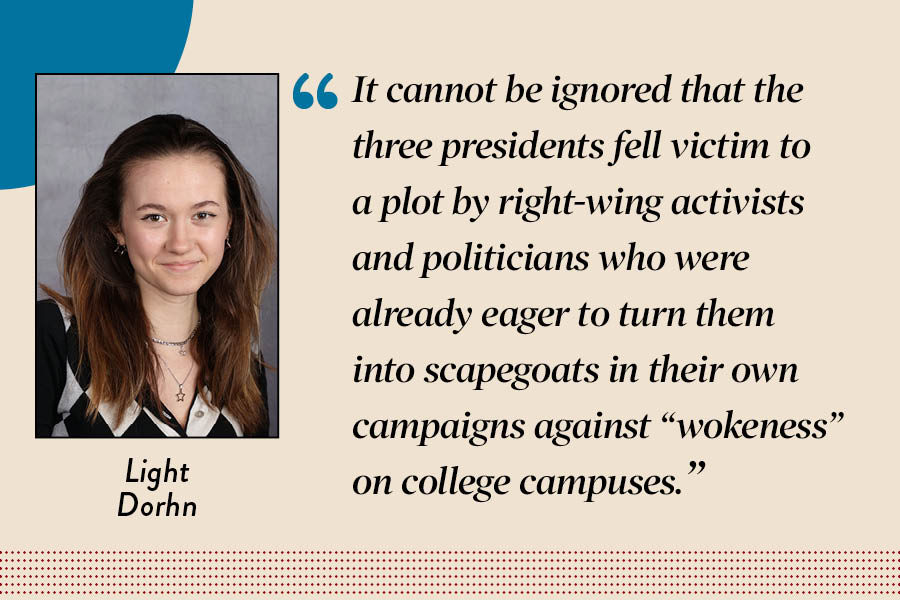On Dec. 5, the presidents of three elite American universities testified in a congressional hearing about antisemitism on their campuses after accusations were made that calls for the “genocide of Jews” were made on university grounds. Subsequently, the testimony delivered by all three women resulted in immense pressure for all three to either resign or be terminated — and two of the three resigned shortly afterward.
Despite the fact that the three presidents who testified in the hearing could have been more forceful in condemning antisemitism on their campuses, the controversies that erupted in the hearing’s aftermath were co-opted by bad-faith ideological figures who were less interested in combating antisemitism than they were in turning the women into pawns for their own political causes— thus, the firestorm of criticism and hate they received in the aftermath was utterly unreasonable and should be rejected henceforth.
All three presidents — Claudine Gay, Harvard; M. Elizabeth Magill, University of Pennsylvania; and Sally Kornbluth, Massachusetts Institute of Technology — were widely criticized for failing to condemn antisemitism forcefully during the hearing. Dr. Magill stepped down from her position only four days after the hearing. Dr. Gay may have kept her job, but a few weeks after her “disastrous testimony,” she was accused of plagiarizing portions of her dissertation and other academic writing from decades ago. She stepped down on Jan. 2, less than a month later. While President Kornbluth still holds her position at MIT, she continues to face fierce opposition.
This might seem at first glance like a case of powerful people facing just consequences for ethical and academic misconduct. University presidents should, of course, be expected to condemn hate speech and to uphold academic integrity to the most rigorous level — and their statements during the hearing were far from impressive, often sounding clumsy and equivocal. That being said, it cannot be ignored that the three presidents fell victim to a plot by right-wing activists and politicians who were already eager to turn them into scapegoats in their own campaigns against “wokeness” on college campuses. Many of the original allegations of hate speech toward Jewish students stemmed from a slogan chanted during pro-Palestinian protests on Harvard’s campus: “From the river to the sea, Palestine shall be free.” The politician who led the questioning at the hearing, Rep. Elise Stefanik, herself a Harvard graduate, dishonestly equated this protest against Israel with calls for violence against Jews — and then pounced when the witnesses appeared to equivocate on the question.
Stefanik’s right-wing allies then took up the cause, digging into the backgrounds of the three women and ultimately making allegations of academic dishonesty in Dr. Gay’s past. Christopher Rufo, a conservative activist best known for demonizing “critical race theory” led the charge, driven not by concerns about antisemitism or academic integrity but by naked partisanship. He admitted recently: “This is a universal strategy that can be applied by the right to most issues.”
When American universities become pawns in culture wars, it undermines the values that make our most elite educational facilities what they are. Ms. Stefanik and Mr. Rufo led a coordinated campaign with the explicit goal of taking down leaders they deemed threatening to their cause — showing the dangers of turning higher education into a new battleground for culture wars that already exist. Those three women are not politicians or activists but academics and administrators — their job is to educate, not to participate in dishonest public spectacles or advocate for causes. It should give us all pause when our country’s most elite educational institutions are turned into punching bags by politicians with axes to grind.





















































